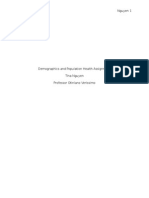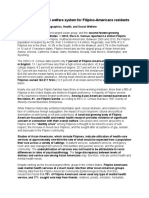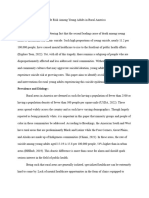0 ratings0% found this document useful (0 votes)
45 viewsAssignment 1 Hsci 301
Assignment 1 Hsci 301
Uploaded by
api-301034352San Bernardino County has a diverse population with whites making up 77% and Hispanics 51.7%. The median household income is $54,090, lower than California's. While 74.3% of adults have health insurance, this is in the worst percentile compared to other counties. Emergency department use in San Bernardino County is average at 29.1 per 100 people, but there are only 186.3 doctors per 100,000 residents, a small number for such a large county.
Copyright:
© All Rights Reserved
Available Formats
Download as DOC, PDF, TXT or read online from Scribd
Assignment 1 Hsci 301
Assignment 1 Hsci 301
Uploaded by
api-3010343520 ratings0% found this document useful (0 votes)
45 views4 pagesSan Bernardino County has a diverse population with whites making up 77% and Hispanics 51.7%. The median household income is $54,090, lower than California's. While 74.3% of adults have health insurance, this is in the worst percentile compared to other counties. Emergency department use in San Bernardino County is average at 29.1 per 100 people, but there are only 186.3 doctors per 100,000 residents, a small number for such a large county.
Original Title
assignment 1 hsci 301
Copyright
© © All Rights Reserved
Available Formats
DOC, PDF, TXT or read online from Scribd
Share this document
Did you find this document useful?
Is this content inappropriate?
San Bernardino County has a diverse population with whites making up 77% and Hispanics 51.7%. The median household income is $54,090, lower than California's. While 74.3% of adults have health insurance, this is in the worst percentile compared to other counties. Emergency department use in San Bernardino County is average at 29.1 per 100 people, but there are only 186.3 doctors per 100,000 residents, a small number for such a large county.
Copyright:
© All Rights Reserved
Available Formats
Download as DOC, PDF, TXT or read online from Scribd
Download as doc, pdf, or txt
0 ratings0% found this document useful (0 votes)
45 views4 pagesAssignment 1 Hsci 301
Assignment 1 Hsci 301
Uploaded by
api-301034352San Bernardino County has a diverse population with whites making up 77% and Hispanics 51.7%. The median household income is $54,090, lower than California's. While 74.3% of adults have health insurance, this is in the worst percentile compared to other counties. Emergency department use in San Bernardino County is average at 29.1 per 100 people, but there are only 186.3 doctors per 100,000 residents, a small number for such a large county.
Copyright:
© All Rights Reserved
Available Formats
Download as DOC, PDF, TXT or read online from Scribd
Download as doc, pdf, or txt
You are on page 1of 4
Demographics and Population Health 1
Demographics and Population Health for San Bernardino County
HSCI 301
Yasmine Franco
Demographics and Population Health 2
Race is a social construct, meaning that it was made up by society and then it was
implemented into several different parts of society in order to classify people into categories
based mostly on physical appearance and where they were born. Genetically and biologically,
there is no difference between human beings and there are no markers to determine this concept
of race. This classification also came with other determinants such as ethnicity and culture.
Ethnicity is what groups a people together based on things such as geographic origins, familial
patterns, religion, language, and morals, values, or beliefs. Culture is what makes us who we are,
individually, or as a group. Culture consists of art, music, knowledge, and customs. It is very
similar to ethnicity, only culture can be changed and learned as it passes from generation to
generation.
In San Bernardino County there are various amounts of race and ethnic groups.
According to the Census website, whites make up about 77% of San Bernardino County.
Hispanics or Latinos make up about 51.7% of San Bernardino County. Other groups reported are
Black/African American, which make up 9.5%, and Asian, which make up 7.3%. Persons under
the age of 18 make up the biggest population in San Bernardino County at about 27.2% and from
a gender perspective, the female population is larger than the male population estimating at about
50.2%. Most of San Bernardino County is also made of family households (76.1%). Married
couple families make up about 52.4% of the County, and people who are 18 years or younger
and have their own children make up 38.9% of the County. Presumably, those in family
households or in married-couple families could lead to better health outcomes compared to those
18 and under persons with children. Teen pregnancy is usually more prevalent in teens coming
from a lower socioeconomic status, for example, which usually leads to more negative health
outcomes.
Demographics and Population Health 3
According to the County of San Bernardino Department of Public Health website, the top
five diseases reported for the county for February of 2011 were chlamydial infections, RSV,
Hepatitis C (Carrier), lapse of consciousness, and gonococcal infections. The most affected age
group for chlamydial infections are persons between ages 20-24. For Hepatitis C the ages most
affected are persons between 45-54. For gonococcal infections, specifically gonorrhea, the ages
most affected are those between the ages 20-24.
The median household income for San Bernardino County is about $54,090 compared to
that of Californias median household income of $61, 094, is not drastically different, but it is
still lower. According to the County of San Bernardino Department of Public Health, this data
derived from Population Estimates, the American Community Survey, the Census of Population
and Housing, and others. Despite this average median household income for San Bernardino
County, the data and statistics depicted on the disparities charts for the County show that overall,
San Bernardino County is doing quite well.
Referring back to the County website, the disparities charts help depict several types of
information such as adults with health insurance by age, gender, and race/ethnicity, as well as,
children. Other information like people with a usual source of health care are also depicted. The
data on these charts show that an overall average of 74.3% of adults in San Bernardino County
have health insurance. Of these adults with health insurance, 79.1% females have insurance, and
69.5% of males have insurance- both of which are high percentages. The race/ethnicity with the
most insured people are, as depicted by the data chart, American Indian/Alaskan Natives. About
89.2% of American Indians and/or Alaskan Native adults have health insurance in San
Bernardino County. Depicted in red markers on the Community Dashboards are those whose
Countys numbers are in the worst percentile (in comparison with other counties). An example of
Demographics and Population Health 4
this is, adults with health insurance. The marker for this is in the worst percentile at 74.3%, and
to get to the best percentile, the rate must be at 78.7%. Healthy People 2020 has a target
percentage of 100.
Emergency department use varies from county to county. Specifically referring to San
Bernardino County, the use seemed to be an average number compared to the rest of the counties
in California. The lowest number for a county was 18.7 per 100 population and the highest being
55.1 per 100 population. San Bernardino County measured out at 29.1 per 100 population. After
reviewing the data, San Bernardino Countys numbers medial compared to the rest of
Californias counties. One of the most shocking pieces of data states that San Bernardino County
has 186.3 doctors per 100,000 population. This is a generally small number for such a large
county, as it is the largest county in the United States, while San Francisco County has about 808
doctors per 100,000. This may very well be due to differences in population, but it is something
to be taken into consideration that may also be due to lack of hospitals and clinics in San
Bernardino County.
You might also like
- Annotated Bibliography On Poverty in The United StatesDocument5 pagesAnnotated Bibliography On Poverty in The United Statesapi-318406991No ratings yet
- Denographic and Populatiom Health Health 301 1Document4 pagesDenographic and Populatiom Health Health 301 1api-302124150No ratings yet
- Nguyen 1Document4 pagesNguyen 1api-302584213No ratings yet
- Assignment 1Document4 pagesAssignment 1api-302630569No ratings yet
- Hsci 301 A1Document2 pagesHsci 301 A1api-301034337No ratings yet
- Assignment 1Document2 pagesAssignment 1api-301956694No ratings yet
- Health OutcomesDocument5 pagesHealth Outcomesapi-352028939No ratings yet
- Assignment 1Document2 pagesAssignment 1api-302596237No ratings yet
- ChnaDocument12 pagesChnaapi-280996915No ratings yet
- Bray Sacdalan Chna 2017 4 Final SubmitDocument14 pagesBray Sacdalan Chna 2017 4 Final Submitapi-301180994No ratings yet
- Health Equity: Ron Chapman, MD, MPH Director and State Health Officer California Department of Public HealthDocument20 pagesHealth Equity: Ron Chapman, MD, MPH Director and State Health Officer California Department of Public HealthjudemcNo ratings yet
- Food Insecurity in YpsilantiDocument17 pagesFood Insecurity in Ypsilantiapi-435449823No ratings yet
- HealthprofileDocument9 pagesHealthprofileapi-298561294No ratings yet
- Document 3 - Poverty and Mental HealthDocument3 pagesDocument 3 - Poverty and Mental Health111 111No ratings yet
- Socioeconomic Status and Barriers Influencing Healthcare Access ADocument25 pagesSocioeconomic Status and Barriers Influencing Healthcare Access Arachellsantiago20No ratings yet
- Health PolicyDocument15 pagesHealth Policyapi-438324478No ratings yet
- Policy PaperDocument11 pagesPolicy Paperapi-679663498No ratings yet
- CHSI - BradleyDocument8 pagesCHSI - BradleyerlangerhealthNo ratings yet
- Socioeconomic, Cultural, and Behavioral Factors Affecting Hispanic Health OutcomesDocument27 pagesSocioeconomic, Cultural, and Behavioral Factors Affecting Hispanic Health OutcomesLLLJJJNo ratings yet
- Transition To AdulthoodDocument41 pagesTransition To AdulthoodLilyNo ratings yet
- Michigan: 2018 County Health Rankings ReportDocument16 pagesMichigan: 2018 County Health Rankings ReportClickon DetroitNo ratings yet
- Population Analysis PaperDocument11 pagesPopulation Analysis Paperapi-285998412No ratings yet
- CHSI - MarionDocument8 pagesCHSI - MarionerlangerhealthNo ratings yet
- Pros and Cons of US Welfare System For Filipino-Americans ResidentsDocument6 pagesPros and Cons of US Welfare System For Filipino-Americans ResidentsElah De LeonNo ratings yet
- Nur330 Final Paper FaganDocument11 pagesNur330 Final Paper Faganapi-569642906No ratings yet
- Health Policy PaperDocument17 pagesHealth Policy Paperapi-385494784No ratings yet
- 1 Davidson CountyDocument11 pages1 Davidson Countyapi-301533058No ratings yet
- CHSI Report - GrundyDocument8 pagesCHSI Report - GrundyerlangerhealthNo ratings yet
- Communities in CrisisDocument23 pagesCommunities in CrisisAnna MooreNo ratings yet
- Community Demographics Paper RevisedDocument8 pagesCommunity Demographics Paper Revisedapi-341635920No ratings yet
- Health Policy PaperDocument12 pagesHealth Policy Paperapi-485472556No ratings yet
- Running Head: Teen Birth Disparities in Sarasota 1Document15 pagesRunning Head: Teen Birth Disparities in Sarasota 1api-456052042No ratings yet
- Fast Facts On Native American Youth and Indian Country: General InformationDocument3 pagesFast Facts On Native American Youth and Indian Country: General InformationSudhit SethiNo ratings yet
- housing-insecurity-mental-health-policy-brief-ada-2024 (1)Document14 pageshousing-insecurity-mental-health-policy-brief-ada-2024 (1)Aleks VorobetsNo ratings yet
- Hispanic Childrens CoverageDocument18 pagesHispanic Childrens Coveragedcastillo_nclrNo ratings yet
- Sociodemographic Profile RevisionDocument12 pagesSociodemographic Profile Revisionapi-298612671No ratings yet
- Kayla Green - Research Paper Draft 1 - Pages 1-3 Include Your Works Cited PageDocument7 pagesKayla Green - Research Paper Draft 1 - Pages 1-3 Include Your Works Cited Pageapi-458133015No ratings yet
- CHSI - SequatchieDocument8 pagesCHSI - SequatchieerlangerhealthNo ratings yet
- Chapter 1 CSR Arianne EsmenaDocument11 pagesChapter 1 CSR Arianne EsmenaTwinie MendozaNo ratings yet
- Health Policy Capstone PaperDocument15 pagesHealth Policy Capstone Paperapi-315208605No ratings yet
- Community Assessment 26 Ebi Template WordDocument9 pagesCommunity Assessment 26 Ebi Template Wordapi-641501601No ratings yet
- LCCR Dhhs Letter Covid 19Document13 pagesLCCR Dhhs Letter Covid 19Stephen LoiaconiNo ratings yet
- Comparisons On Population Growth Rates in Nigeria and United StatesDocument5 pagesComparisons On Population Growth Rates in Nigeria and United StatesKyteNo ratings yet
- Sarche and SpicerDocument14 pagesSarche and Spicergordygohard27No ratings yet
- Making An Impact On Hispanic Community Health in Lehigh County, PennsylvaniaDocument8 pagesMaking An Impact On Hispanic Community Health in Lehigh County, PennsylvaniaTim RogersNo ratings yet
- Abigail Marissa Chna 2017Document14 pagesAbigail Marissa Chna 2017api-360775870No ratings yet
- Brittanylkeener hlth634 b01 Eportfolio3Document5 pagesBrittanylkeener hlth634 b01 Eportfolio3api-309529840No ratings yet
- Capstone Paper Project FormativeDocument11 pagesCapstone Paper Project Formativeapi-325259254No ratings yet
- South Carolina: 2018 County Health Rankings ReportDocument16 pagesSouth Carolina: 2018 County Health Rankings ReportGreenville NewsNo ratings yet
- What Will It Take To End Homelessness?Document6 pagesWhat Will It Take To End Homelessness?stainedClassNo ratings yet
- SPCC PovertyDocument6 pagesSPCC Povertyyingjiahang0816No ratings yet
- Newsletter Rough DraftDocument13 pagesNewsletter Rough Draftankush.thakurblogNo ratings yet
- Hca 300 County FinalDocument13 pagesHca 300 County Finalapi-490705060No ratings yet
- Unit VI 1Document22 pagesUnit VI 1maywayrandomNo ratings yet
- Health Policy Hillsborough CountyDocument14 pagesHealth Policy Hillsborough Countyapi-430800277No ratings yet
- HMP 601 Midterm PaperDocument4 pagesHMP 601 Midterm PaperDavontae Foxx-DrewNo ratings yet
- Me Too's COVID-19 Economic Impact ReportDocument35 pagesMe Too's COVID-19 Economic Impact ReportAlanna JeanNo ratings yet
- UW SPH 380 Research EssayDocument8 pagesUW SPH 380 Research Essaylanes550No ratings yet
- Strategies for Awareness & Prevention of Hiv/Aids Among African-Americans: A Hand BookFrom EverandStrategies for Awareness & Prevention of Hiv/Aids Among African-Americans: A Hand BookNo ratings yet
- Montana Constitutional Convention Vol 1Document556 pagesMontana Constitutional Convention Vol 1white1234500No ratings yet
- Amendments To The Indian Constitution - UPSC GuideDocument5 pagesAmendments To The Indian Constitution - UPSC GuideKritika K OmkarNo ratings yet
- Jeremy Waldron - Representative LawmakingDocument21 pagesJeremy Waldron - Representative LawmakingJoão Leite Mendonça TavaresNo ratings yet
- Anarchism Utopias and Philosophy of Educ PDFDocument20 pagesAnarchism Utopias and Philosophy of Educ PDFCabra CobraNo ratings yet
- Maharashtra Administrative Tribunal Mumbai Bench at Aurangabad ORIGINAL APPLICATION NO.334/2021, 55/2023 AND 42/2023 District:-ParbhaniDocument17 pagesMaharashtra Administrative Tribunal Mumbai Bench at Aurangabad ORIGINAL APPLICATION NO.334/2021, 55/2023 AND 42/2023 District:-Parbhaniishaclinic0811No ratings yet
- Park, Robert. Suggestions of The Investigation of Human Behavior in The City Enviroment PDFDocument37 pagesPark, Robert. Suggestions of The Investigation of Human Behavior in The City Enviroment PDFDaniza Méndez OrdóñezNo ratings yet
- Terrorism and Beyond: A 21st Century PerspectiveDocument7 pagesTerrorism and Beyond: A 21st Century PerspectiveJim Cooper100% (1)
- Indian Constitution IntroductionDocument28 pagesIndian Constitution IntroductionBhagirath AshiyaNo ratings yet
- Lord Clive v. Edmund Burke: Two Perspectives On British Involvement in IndiaDocument2 pagesLord Clive v. Edmund Burke: Two Perspectives On British Involvement in IndiaZoqid KhanNo ratings yet
- Kinship Ties and Social Networks: Politics of KinshipDocument3 pagesKinship Ties and Social Networks: Politics of Kinshiproxann djem sanglayNo ratings yet
- 01 Rizal LawDocument3 pages01 Rizal LawJohn Ernest PlatilNo ratings yet
- Social Studies 11 Provincial Exam - Review Guide Takes From Ministry SiteDocument5 pagesSocial Studies 11 Provincial Exam - Review Guide Takes From Ministry SiteRoarRooNo ratings yet
- Teleological Approach To InterpretationDocument11 pagesTeleological Approach To InterpretationEmmanuel Nhachi90% (10)
- Judreview DBQDocument2 pagesJudreview DBQNihirPatelNo ratings yet
- 14-35420 #193Document29 pages14-35420 #193Equality Case FilesNo ratings yet
- Constitutional Law Case Digest CompilationDocument7 pagesConstitutional Law Case Digest CompilationMark Evan GarciaNo ratings yet
- The Rise of PopulismDocument3 pagesThe Rise of PopulismARTHUR BANDOLIN JR.No ratings yet
- Damming AfghanistanDocument27 pagesDamming AfghanistanAsfandyar DurraniNo ratings yet
- FATCA CRS Curing DeclarationDocument1 pageFATCA CRS Curing DeclarationramdpcNo ratings yet
- Constitution As A Tumbler Half Empty or Half FullDocument6 pagesConstitution As A Tumbler Half Empty or Half FullParth VashishthaNo ratings yet
- World War One NotesDocument12 pagesWorld War One Notesapi-341021499100% (1)
- Islam-Primary Source, Pact of UmarDocument1 pageIslam-Primary Source, Pact of Umarapi-240981937No ratings yet
- Political Compass V 0.1. 2016: Alejandro Zaera-Polo & Guillermo Fernandez-AbascalDocument5 pagesPolitical Compass V 0.1. 2016: Alejandro Zaera-Polo & Guillermo Fernandez-AbascalAna CristeaNo ratings yet
- Unit 2 Essay 2Document2 pagesUnit 2 Essay 2api-280936182No ratings yet
- MRRP TMT For August Eng 2021 1Document4 pagesMRRP TMT For August Eng 2021 1Kartik KandangkelNo ratings yet
- Biodiversity: Berchtesgaden National Park Unesco Biosphere ReserveDocument3 pagesBiodiversity: Berchtesgaden National Park Unesco Biosphere ReserveANTHONY WAYNENo ratings yet
- Zablocki V RedhailDocument4 pagesZablocki V RedhailRoland OliquinoNo ratings yet
- V 12 I 9 Sep 2012Document786 pagesV 12 I 9 Sep 2012badminton12No ratings yet
- Agains The StreetsDocument22 pagesAgains The Streetsvacamulticolor2001No ratings yet
- Selection Notification To Group I Services (15 - 201118 - 2011)Document4 pagesSelection Notification To Group I Services (15 - 201118 - 2011)ravitejaNo ratings yet

























































































